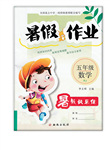题目内容
It was unusual that such close neighbors ______ not know one another.
A. could B. would C. must D. should
练习册系列答案
 暑假作业暑假快乐练西安出版社系列答案
暑假作业暑假快乐练西安出版社系列答案
相关题目
题目内容
It was unusual that such close neighbors ______ not know one another.
A. could B. would C. must D. should
 暑假作业暑假快乐练西安出版社系列答案
暑假作业暑假快乐练西安出版社系列答案